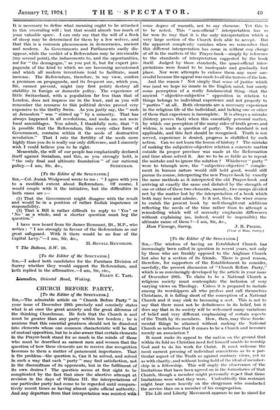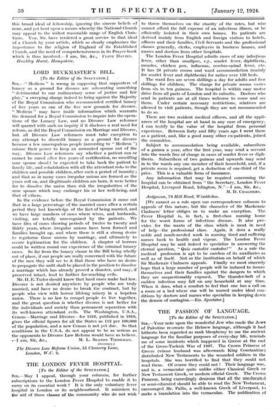[To the Editor of the SPECTATOR.]
SIR,—The wisdom of having an Established Church has increasingly been called in question in recent years, not only by those who are frankly opposed to the Anglican Church but also by a section of its friends. There is good reason, therefore, for supporters of the Establishment to consider, carefully, the present discussion of "Church Before Party," which is so convincingly developed by the article in your issue of December 20th. To claim to be a National Church -a religious society must contemplate the inclusion of very varying views on Theology. Unless it is prepared to include among its worshippers all who profess and call themselves Christians, it is falling short of the conception of a National Church and it may sink to becoming a sect. This is not to say that there must not be definiteness in its belief, but it does say that in its society will be welcomed many variations of belief and very different emphasizing of certain aspects of the Truth by its members. How, then, may these funda- mental things be attained without making the National Church so nebulous that it ceases to be a Church and becomes merely an association It must make its appeal to the nation on the ground that within its fold no Christian need feel himself unable to worship God and to do his work for Christ. It must welcome the most earnest pressing of individual convictions as to a par- ticular aspect of the Truth as against contrary views, yet so as with charity, and without losing hold of the ideal of member- ship in a fellowship. This will imply the observance of the limitations that have been agreed on in the formularies of that Church, though a member might personally regct that those limitations were what they were. Undoubtedly this restraint might bear more heavily on the clergyman who conducted the service than on a member of his congregation.
The Life and Liberty Movement appears to me to stand for
this broad ideal of fellowship, ignoring the sincere beliefs of none, and yet bent upon a means whereby the National Church may appeal to the widest reasonable range of English Chris- tians. You, Sir, have rendered a great service to that ideal of a Church by your article, which so clearly emphasizes the importance to the religion of England of its Established Church, and the need of comprehensiveness in its Prayer-book which is thus involved.—I am, Sir, &C., CLIVE DAVIES.
Hawkley Hurst, Hampshire.







































 Previous page
Previous page